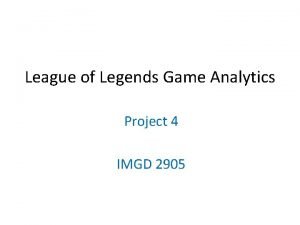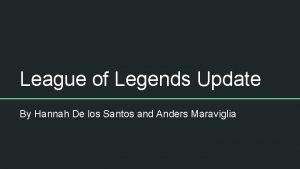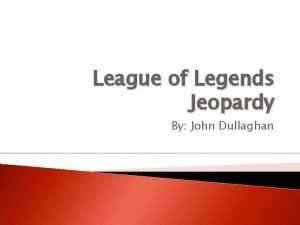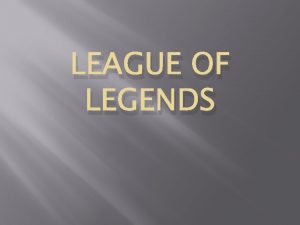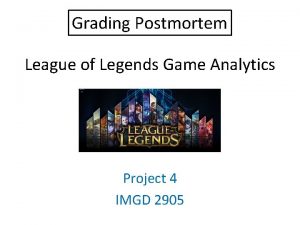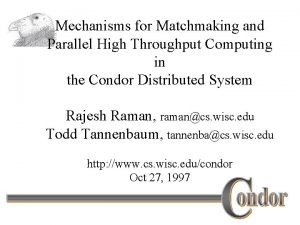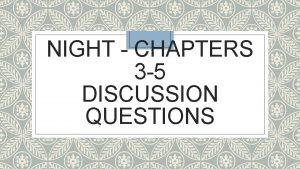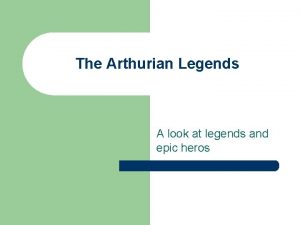Surrender at 20 Matchmaking in League of Legends


















- Slides: 18

Surrender at 20? Matchmaking in League of Legends Mark Claypool, Jonathan Decelle, Gabriel Hall, and Lindsay O'Donnell claypool@cs. wpi. edu Computer Science and Interactive Media & Game Development Worcester Polytechnic Institute 1

• Online games typically coop or player-versus-player – Critical to have games balanced for fun Fun Introduction Sweet spot Too hard! Just right! Too easy! • Matchmaking – process of Game Balance grouping players of similar skill • Improve? Some published work [1, 2] but lacking… 1. Matchmaking in practice 2. Matchmaking correlated with player opinion 2

Matchmaking in League of Legends • This paper matchmaking in League of Legends (Lo. L) • League of Legends (Riot Games 2009) – Played by more than 27 million people each day [3] – Professional leagues • Players ranked, teams of 5 players, team vs. team – If really imbalanced game? Can surrender 20 minutes in • User study – Play Lo. L in controlled environment – Record objective data (e. g. , player rank and game stats) – Provide survey for subjective data (e. g. , match balance and enjoyment) 3

Teasers Objective • Teams are balanced – 50% players within 1 rank of each other • Games are balanced – 80% teams within 1 average rank of each other Subjective • Games are not balanced • When players win, perceive slight imbalance • When players lose, perceive large imbalance • Players enjoy winning more than losing (no surprise) • (Surprise!) Players most enjoy matches imbalanced in their favor! 4

Outline • • Introduction Methodology Results Conclusion (done) 5

Methodology • Computer lab with 9 computers – Windows 7 – Lo. L version 4. 21 – Intel i 7 -3770 3. 4 GHz, 12 GB DDR 3 RAM, AMD Radeon graphics, 24” Dell monitors, Headsets 1. Players provide demographic information 2. Play game (solo queue) 2. (We gather objective data from OP GG https: //na. op. gg/ ) 3. Players provide subjective opinions 6

Outline • Introduction • Methodology • Results (done) (next) – Demographics – Objective balance – Subjective balance – Enjoyment • Conclusion 7

Demographics • 52 complete responses • 23 unique users – 70% white, mostly 18 -22 years, mostly males • Most played Lo. L – 80% once a week – 50% once a day – 60% played solo Our study slightly more uniform distribution of rank than Lo. L population 8

Objective Team Imbalance Goal: Players of similar skill on each team Result: Most teams are balanced But about 10% more than 3 from mean 9

Objective Game Imbalance Goal: Teams of similar rank versus each other Result: Most games evenly matched But about 5% difference of 2 from mean 10

Subjective Game Imbalance (1 of 3) “How even did you feel the game was? ” Little correlation in subjective imbalance and objective imbalance Equalizing team ranks alone not sufficient 11

Subjective Game Imbalance (2 of 3) Players generally felt imbalance in other teams favor 12

Subjective Game Imbalance (3 of 3) Win? Game is balanced Lose? Game is imbalanced 13

Subjective Game Enjoyment “How enjoyable was the game you played? Win? Game is fun (70%), never not fun Lose? Game is almost never fun (90%) 14

Fun Enjoyment versus Balance Sweet spot Game Balance Fun Sweet spot? Game Balance Imbalance in player’s favor the most fun! 15

Conclusion • Matchmaking critical for making teams, making matches • But little published work on matchmaking systems and player opinions on them • This paper study of matchmaking for League of Legends – Objective (rank) and Subjective (balance and fun) • Results: – Objectively teams and games are balanced – Subjectively games only balanced for winning players – Imbalanced games in players favor are the most fun! • Matchmaking systems may want to consider – e. g. , balance not so important, as long as player not always on imbalanced side 16

Future Work • Other Lo. L game modes – Normal (unranked), Dominion, 3 v 3 • Analysis of other objective data (e. g. , in-game stats) • Other Lo. L-type games – Defense of the Ancients 2 (Valve 2013), Heroes of the Storm (Blizzard 2015) • Use subjective and objective data in matchmaking 17

Surrender at 20? Matchmaking in League of Legends Mark Claypool, Jonathan Decelle, Gabriel Hall, and Lindsay O'Donnell claypool@cs. wpi. edu Computer Science and Interactive Media & Game Development Worcester Polytechnic Institute 18
 League of legends analytics
League of legends analytics League of legends hannah
League of legends hannah 450 ip champions
450 ip champions Tyler leong
Tyler leong League of legends maps
League of legends maps League of legends grade
League of legends grade Matchmaking
Matchmaking 4 lom conclusion
4 lom conclusion Matchmaking rank
Matchmaking rank Arpita choudhury age
Arpita choudhury age Business matchmaking algorithm
Business matchmaking algorithm Where did general lee surrender to general grant?
Where did general lee surrender to general grant? Drench my soul as mercy and grace unfolded
Drench my soul as mercy and grace unfolded Chapter 4 night discussion questions
Chapter 4 night discussion questions Confederate surrender day
Confederate surrender day Surrender
Surrender British surrender at saratoga
British surrender at saratoga Abraham lincoln
Abraham lincoln Surrender at 20
Surrender at 20
